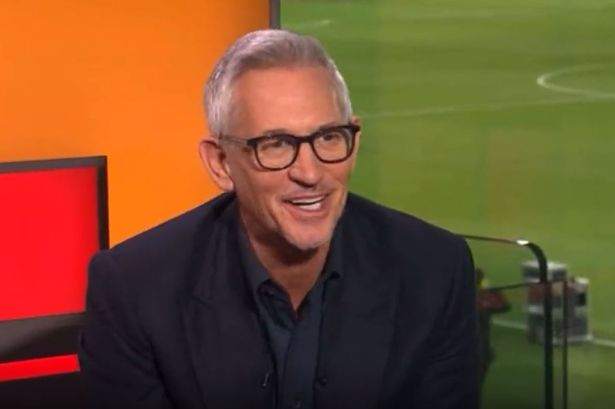By Gavin Mackintosh-
Stubborn Gary Lineker(pictured) has said he will try to keep speaking up for people with “no voice”, after criticism of his tweets on the government’s asylum policy sparked criticism.
The Match of the Day host had attacked the Home secretary’s stringent rules in preventing illegal immigration by banning people arriving illegally in the Uk from ever claiming asylum.
Lineka said the language setting out the plan was “not dissimilar to that used by Germany in the 30s, leading to the BBC saying it was having a “frank conversation” with Lineker about the BBC’s need to remain impartial.
The presenter was responding to the government’s outlined plans to ban people arriving in the UK illegally from ever claiming asylum, in a bid to address a rise in the number of people crossing the Channel in small boats.
Opposition MPs have strongly criticised the proposals to detain and remove adults regardless of their asylum claim .
However, the government has defended the plan, saying stopping the crossings is a priority for the British people. Restricting immigration levels has always been one the important policies of the British government which it has failed to meet over the years.
In the Home Office’s efforts to restrict immigration numbers, many brits will not welcome Lineka’s comments, viewed as an effort to be noticed beyond the attention he has from being on television.
But like Jeremy Clarkson, who crossed the line with his unacceptable article against Meghan Markle in The Sun Newspaper, Lineka appears to escape punishment each time.
Lineka described it on Twitter as an “immeasurably cruel policy directed at the most vulnerable people in language, not dissimilar to that used by Germany in the 30s”.
His remarks were criticised widely by Conservative MPs and ministers, including Ms Braverman and Downing Street.
Lineker tweeted: “Great to see the freedom of speech champions out in force this morning demanding silence from those with whom they disagree.”
He followed up shortly after with: “I have never known such love and support in my life than I’m getting this morning (England World Cup goals aside, possibly). I want to thank each and every one of you. It means a lot.
“I’ll continue to try and speak up for those poor souls that have no voice.”
Earlier, Ms Braverman told BBC One’s Breakfast she was “disappointed, obviously” in his comments.
“I think it’s unhelpful to compare our measures, which are lawful, proportionate and – indeed – compassionate, to 1930s Germany.
“I also think that we are on the side of the British people here.”
Downing Street later said Lineker’s criticism of the new asylum policy was “not acceptable”.
The prime minister’s press secretary told reporters: “It’s obviously disappointing to see someone whose salary is funded by hard-working British (licence fee) payers using that kind of rhetoric and seemingly dismissing their legitimate concerns that they have about small boats crossings and illegal migration.”.
A spokesman for Labour leader Sir Keir Starmer said comparisons with Germany in the 1930s “aren’t always the best way to make” an argument.
Lineker, who has presented Match of the Day since 1999, is the BBC’s highest paid presenter, earning over £1m a year. He may be getting too big for his boots.
He has in the past been vocal about migrants’ rights and has taken refugees into his home.
Last October, the BBC’s complaints unit found Lineker had broken impartiality rules in a tweet asking whether the Conservative Party planned to “hand back their donations from Russian donors”. Some analysts from The Eye of Media’s thinktank considered the question at the time to be fair comment, more akin to freedom of speech.
The BBC presenter’s comment at the time came after the then Foreign Secretary Liz Truss urged Premier League teams to boycott the Champions League final in Russia over the invasion of Ukraine. This time, his comments have been deemed ”a step too far”, from the same analysts which include university lecturers, teachers, ex navy personnel, and social workers.
Earlier on Wednesday, when asked about how many “strikes” the presenter has had over social media posts, Mr Davie said he wasn’t going to speak specifically about individuals- a cop put from a simple and relevant question.
Mr Davie added: “I think the BBC absolutely puts the highest value on impartiality and that’s clearly important to us.”
In a series of tweets on Wednesday, Lineker indicated he had no intention of retracting his comment or steering clear of politics outside of his work for the BBC.
Richard Sambrook, the BBC’s former director of global news, said the controversy highlighted the need for the broadcaster to clarify how impartiality rules apply to its sport staff and freelancers.
He told Radio 4’s PM programme similar cases would “corrode trust” in the BBC unless the position was made clearer.
The BBC remains one of the most respected broadcasters in the Uk, but needs to be clear about its impartiality rules, and how it intends to deal with breaches in future.
Members of the media must be the last people to avoid answering questions in public interest.

